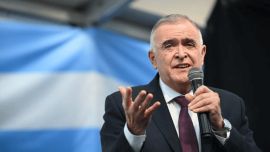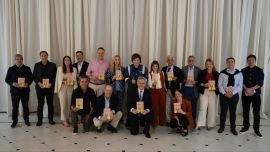Fresh from securing their first major trade pact, the leaders of the Mercosur bloc are getting greedy: this week, Argentina announced their intention to negotiate an ambitious free-trade agreement with the United States.
Last week’s deal with the European Union, sealed after more than two decades of on-off negotiations, delivered a key victory for Presid e n t M a u r i c i o Macri, ahead of his re-election bid in October, and for his Brazilian counterpart Jair Bolsonaro, who is looking to build some political momentum after a difficult few months in power himself.
Now the two have set their sights on Washington and US President Donald Trump. President Macri revealed Thursday that his government is talking with Brazil about a potential US free-trade deal, less than a week after landing one with the European Union. Foreign Minister Jorge Faurie first broke the news Wednesday night during a TV interview. They also noted that a deal with Canada is in the works, and could be signed this year, while South Korean and Singapore are also in the near-future.
“We think this would complement what we just finished with the European Union,” Faurie said this week, adding that Brazilian and Argentine leaders have brought up the topic with their US counterparts.
“These are all plates onto which we can put Argentine products, and this is hard work,” the diplomatic chief said.
Brazilian officials claimed authorship of the idea, according to Clarín daily. Economy Minister Paulo Guedes and deputy minister for Commerce and International Affairs Marcos Troyjo held conversations with first line officials in Donald Trump’s Cabinet, including Commerce Secretary Wilbur Ross and commercial representative Robert Lighthizer.
The talks began in March in Washington and were reported to Argentine Production Minister Dante Sica. Congress has already granted the Executive with Transport Promotion Authority (TPA), meaning they can formally move forward with the negotiations.
EU-MERCOSUR DEBATE
Regarding the recently signed trade deal with the EU, Foreign Minister Faurie denied that any specific sector of the economy is “condemned to disappear” and insisted that the deal was “not the end of national industry.”
“We have put together a tariff reduction scheme that will cushion, greatly, the Mercosur side of the agreement in the process of adaptation. The bulk of European products will only begin to arrive during years 7 to 15. As such, there is more than enough time for adaption,” Faurie said adding that the tariffs are programmed such that Mercosur products will be able to compete faster.
President Macri also fended off criticism that the deal would harm the Argentine economy and echoed the Foreign Minister saying that “within months,” the country will move forward with agreements with China, the US and Canada.
“It is false that this deal will hurt the Argentine market. This is an agreement that will generate employment and took into account all of the concerns. And we will take care of our national industry,” the head of state emphasised.
Macri argued that the deal marks a reversal for Argentina after decades of protectionism. Meeting with Argentine business leaders this week, he declared that the country has “a historic opportunity MercosurEU agreement.”
“The demand for our products will multiply and we must prepare to increase our production. The world wants to build relationships with us. The world believes that we are capable of contributing. And within a few months with will begin working towards [trade agreements with] Canada, the US and China,” he said.
The deal is one of Macri’s
marquee pieces of policy, accompanying a successful insertion of Argentina into the global
community after years of Kirchnerite isolationism. With the
political campaign fully underway, Macri’s electoral team
is looking to capitalise on the
deal, and the President’s good
relationship with global leaders, while contrasting with
C r i s t i n a Fe r n á nd e z d e
Kirchner’s foreign policy record. Already, Alberto Fernández who leads the opposition
ticket, has called the deal disastrous while Axel Kicillof, former Economy Minister under
Cristina and current candidate
for the Buenos Aires Province
governorship, indicated it is
being used to “cover up current
problems.” In Macri’s camp,
they hope the Kirchnerist position will push undecided voters
to their arms.related news





















Comments